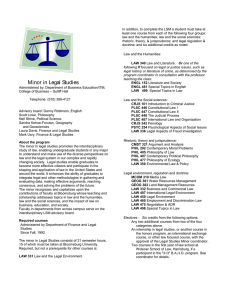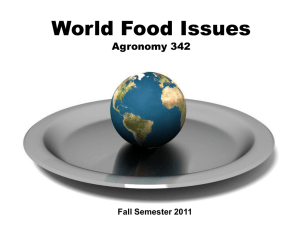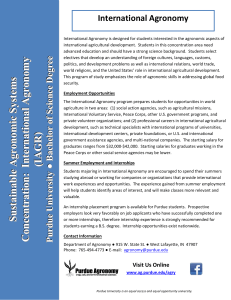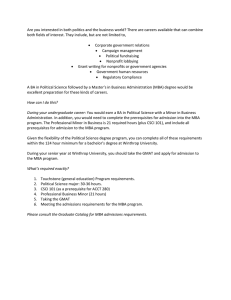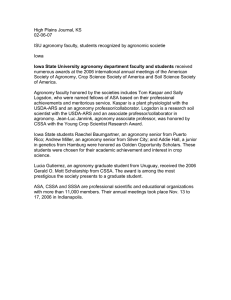AGENDA ITEM NO: 13.1 UNIVERSITY COUNCIL ACADEMIC PROGRAMS COMMITTEE
advertisement
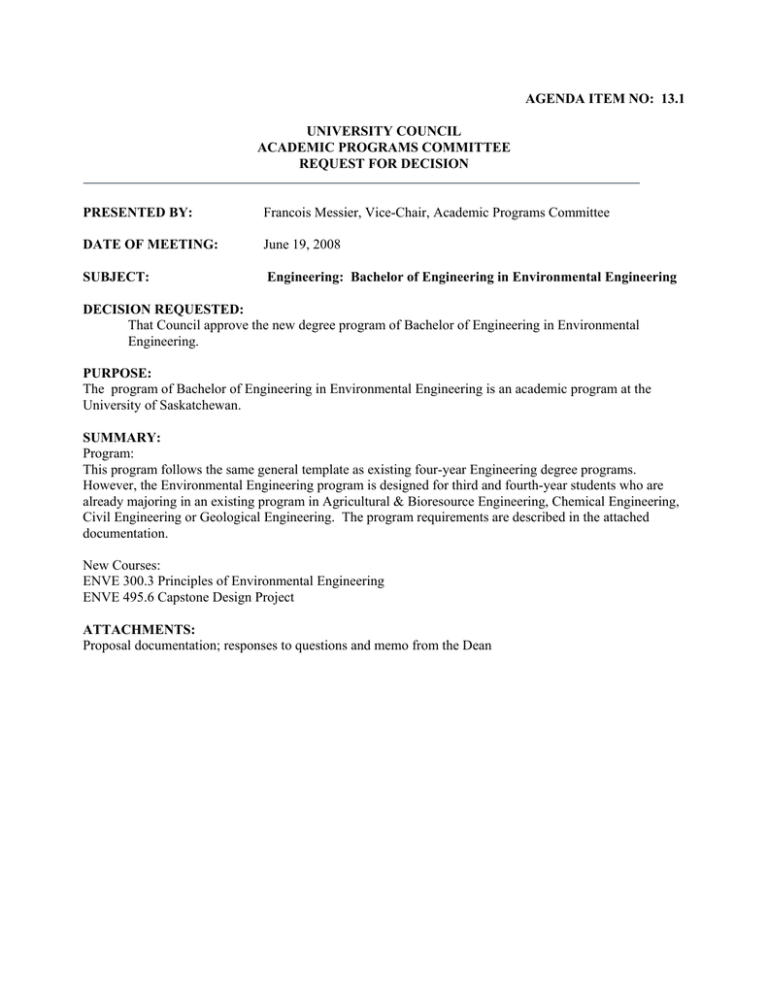
AGENDA ITEM NO: 13.1 UNIVERSITY COUNCIL ACADEMIC PROGRAMS COMMITTEE REQUEST FOR DECISION PRESENTED BY: Francois Messier, Vice-Chair, Academic Programs Committee DATE OF MEETING: June 19, 2008 SUBJECT: Engineering: Bachelor of Engineering in Environmental Engineering DECISION REQUESTED: That Council approve the new degree program of Bachelor of Engineering in Environmental Engineering. PURPOSE: The program of Bachelor of Engineering in Environmental Engineering is an academic program at the University of Saskatchewan. SUMMARY: Program: This program follows the same general template as existing four-year Engineering degree programs. However, the Environmental Engineering program is designed for third and fourth-year students who are already majoring in an existing program in Agricultural & Bioresource Engineering, Chemical Engineering, Civil Engineering or Geological Engineering. The program requirements are described in the attached documentation. New Courses: ENVE 300.3 Principles of Environmental Engineering ENVE 495.6 Capstone Design Project ATTACHMENTS: Proposal documentation; responses to questions and memo from the Dean Insert PDF document Environmental Engineering AGENDA ITEM NO: 11.2 UNIVERSITY COUNCIL ACADEMIC PROGRAMS COMMITTEE REQUEST FOR DECISION PRESENTED BY: Gordon Hill, Vice-Chair, Academic Programs Committee DATE OF MEETING: June 19, 2008 SUBJECT: Agriculture & Bioresources: reinstatement of the Agronomy major DECISION REQUESTED: That Council approve reinstatement of the Agronomy field of specialization at the major level in the Bachelor of Science in Agriculture program. PURPOSE: The Bachelor of Science in Agriculture (BSA) field of specialization in Agronomy is an academic program at the University of Saskatchewan. SUMMARY: The College revised this major in 2002, as described in the attached materials. The major in Agronomy will consist of the common core courses from the BSA degree program and from the Plant Science program in the Department of Plant Science. Students who complete the Agronomy Diploma program will be eligible to continue toward this degree. The Agronomy major integrates principles of economical and sustainable field crop production. The addition of four new courses in agronomy created out of major revisions to the Diploma in Agriculture will significantly expand the offerings in Agronomy. These courses will be approved through Course Challenge following college-level approval. ATTACHMENTS: Proposal documentation; memos of support Proposal for Curriculum Change to be approved by Council or by Academic Programs Committee 1. PROPOSAL IDENTIFICATION Title of proposal: Agronomy Degree(s): BSA Level(s) of Concentration: Major Degree College: Agriculture and Bioresources Department: Plant Sciences Contact person(s) (name, telephone, fax, e-mail): Bruce Coulman, Head Department of Plant Sciences College of Agriculture and Bioresources 966-1376 Bruce.coulman@usask.ca Dan Pennock Associate Dean (Academic) College of Agriculture and Bioresources 966-4056 dan.pennock@usask.ca Date: March12, 2008 Approved by the degree college and/or home college: March 6, 2008 Proposed date of implementation: September, 2008 2. TYPE OF CHANGE Addition of a higher Level of Concentration to an existing Field of Specialization. The Agronomy theme in the Plant Science major will be reestablished at the Major Level of Concentration. 3. RATIONALE Agronomy was reduced from a Major to a Theme within the PLSC Major in response to the SPR process of 2000-2001. Agronomy was rated as a B program in the SPR process and the course content of the program was well regarded by the reviewers. The major weakness identified was the lack of an administrative home and inconsistencies in the advising received by students (at the time of SPR there were advisors for Agronomy in PLSC, SLSC, and AGEC). In response to the SPR process Agronomy, along with Majors in Crop Science, Horticulture Science, and Plant Ecology/Rangeland Resources, was reduced to a theme within a unified PLSC Major. As of Sept. 25 2007 there were 53 students in the Agronomy theme, 5 in Horticulture, 6 in Plant Improvement, 2 in Rangeland, and 19 in general PLSC or undecided. The Agronomy theme is the 2nd largest “program” in the College (following ANSC at 133 students and ahead of EVSC at 51 students). At the time that Agronomy was reduced to a theme there was a hope that themes could be listed on the transcript. This has not occurred, and is not likely to occur in the near future. We believe that Agronomy should be re-established as a Major for the following reasons: 1) The Agronomy theme is the second largest “program” in the College and has considerable potential for growth in student numbers. As a theme in lacks the visibility in recruitment efforts (e.g. University website, SESD print materials) that would allow it to achieve its full enrolment potential. 2) The College has recently established a Diploma in Agronomy which has been designed to ladder into a degree program. The Diploma cannot directly ladder into the existing PLSC major but the proposed Agronomy Major allows a full 2+2 laddering (i.e., 60 cu of credit for the 2 year diploma). 3) The re-positioning of Diploma-level courses as Degree-level courses lead to the creation of four new degree-level courses in Agronomy that significantly expand our course offerings in Agronomy. As well, several degree-level courses to support the Agronomy programs are under development by Agricultural and Bioresource Engineering. This significant expansion in Agronomy courses differentiates the proposed Agronomy major from the existing PLSC Major. 4) The administrative home for the proposed Agronomy major will be the Department of Plant Science. This addresses the major issue raised in the SPR document. 4. DESCRIPTION OF PROGRAM CHARACTERISTICS The proposed major in Agronomy includes a common core from the BSA degree as well as one from the Plant Science major in the Department of Plant Sciences. The Agronomy major integrates principles of economical and sustainable field crop production. The addition of four new courses in agronomy created out of major revisions to the Diploma in Agriculture significantly expands the offerings in Agronomy. Graduates will have practical skills in field agronomy and diagnostics along with an understanding of the biological, ecological and economic principles of crop production and soil management, and an appreciation of the short and long term effects of agricultural production on the environment. Table 1: Courses of the proposed Agronomy Major. College Core 39 cu AGRC 111.3 Soil/Plant/Environment AGRC 112.3 Animal/Food AGRC 113.3 Agri‐Food Issues and Institutions BIOL 120.3 The Nature of Life CHEM 112.3 Struct. Bonding and Prop. Materials CHEM 250.3 Organic Chem ECON 111.3 Price Theory and Res. Alloc 3 cu HUM, FA, SS 3 cu HUM, FA, SS 3 cu English RCM 300.3 Communications AGRN 492.3/496.6 Term Paper/Thesis MATH 101.3 or 110.3 Required SLSC 240.3 BIOL 222.3 BIOL 226.3 BIOL 331.3 PLSC 213.3 PLSC 220.3 PLSC 222.3 PLSC 314.3 PLSC 335.3 SLSC 312.3 AGEC 320.3 PLSC 401.3 PLSC 417.3 Restricted Electives 6 cu from BIOL 345.3 EVSC 420.3 PLSC 340.3 PLSC 345.3 PLSC 234.3 SLSC 313.3 ANSC 375.3 3 cu from SLSC 322.3 SLSC 343.3 ABE 309.3 SLSC 430.3 ABE 205.3 3 cu from AGEC 343.3 AGEC 420.3 AGEC 435.3 AGEC 346.3 3 cu from PLSC 418.3 PLSC 420.3 PLSC 422.3 PLSC 441.3 PLSC 451.3 ANSC 410.3 Minor Open Electives 39 cu Agricultural Soil Science The Living Plant Genes to Genomics Introductory Plant Physiology Principles of Plant Ecology Fundamentals of Horticulture Introduction to Field Crops Statistical Methods Integrated Pest Management Soil Fertility and Fertilizers Introduction to Farm Business Management Sustainable Crop Production Crop Physiology 15 cu Introductory Plant Pathology Env. Fate and Transport Toxic. Sub. Weed Biology and Ecology Pesticides and Crop Protection Weed Control in Organic Agriculture Environmental Soil Chemistry Animal Agriculture and the Environment Applied Soil Physics Soil Microbiology Water Management Agroforestry for Environmental Management Agricultural Machinery Management I Grain and Livestock Market. Farm and Agric. Business Operations Management Agricultural Finance and Appraisal Principles of Selling Management of Arable Grassland Grain Chemistry and Technology Rangeland Ecology and Management Fruit Science Vegetable Science Grazing Animal Production 18 cu (minors in Field Crop Production, Horticulture, and Rangeland resources are not permitted) 9 cu Calendar Entry First Year (30 credit units) AGRC 111.3, Agricultural Science I; BIOL 120.3,The Nature of Life; ECON 111.3, Price Theory and Resource Allocation; CHEM 112.3, General Chemistry I; CHEM 250.3, Intro to Organic Chemistry; AGRC 112.3, Agricultural Science II; AGRC 113.3, Agri-Food Issues and Institutions; BIOL 222.3, The Living Plant; 6 cu chosen from Social Science, Humanities or Fine Arts. Second Year (27 credit units) RCM 300.3, Effective Professional Communication; SLSC 240.3, Agricultural Soil Sciences; MATH 101.3, Elementary Calculus OR MATH 110.3, Calculus; BIOL 226.3, Genes to Genomics; PLSC 220.3, Introduction to Horticulture; PLSC 213.3, Principles of Plant Ecology; PLSC 222.3, Introduction to Field Crops; one of ENG 111.3, 112.3, 113.3 or 114.3; PLSC 314.3, Statistics; plus a 3 cu open or restricted elective chosen from the third and fourth year of the program Third and Fourth Year (63 credit units) Required (36 cu): PLSC 335.3, Integrated Pest Management; BIOL 331.3, Plant Physiology; SLSC 312.3, Soil Fertility and Fertilizers; BPBE (AGEC) 320.3, Intro to Farm Business Management; PLSC 401.3, Sustainable Crop Production ; PLSC 417.3, Crop Physiology; AGRC 492.3 or 494.6, Thesis, plus 15 credit units from the following: 6 cu chosen from BIOL 345.3, Introductory Plant Pathology EVSC 420.3, Environmental Fate and Transport of Toxic Substances PLSC 340.3, Weed Biology and Ecology PLSC 345.3, Pesticides and Crop Protection PLSC 234.3, Weed Control in Organic Agriculture SLSC 313.3, Environmental Soil Chemistry 3 cu chosen from SLSC 322.3, Applied Soil Physics SLSC 343.3, Soil Microbiology ABE 309.3, Water Management SLSC 430.3, Agroforestry for Environmental Management ABE 205.3, Agricultural Machinery Management I 3 cu chosen from AGEC 343.3, Grain and Livestock Marketing AGEC 420.3, Farm and Agricultural Business Operations Management AGEC 435.3, Agricultural Finance and Appraisal AGEC 346.3, Principles of Selling 3 cu chosen from PLSC 418.3, Management of Arable Grassland PLSC 420.3, Grain Chemistry and Technology PLSC 422.3, Rangeland Ecology and Management PLSC 441.3, Fruit Science PLSC 451.3, Vegetable Science ANSC 375.3, Animal Agriculture and the Environment ANSC 410.3, Grazing Animal Production Restricted Electives (18 cu): Students can choose to complete a minor (not including Field Crop Production, Horticulture or Rangeland Resources) or a selection of courses approved by an advisor. Open Electives (9 cu) 5. RESOURCES No new resources will be required. Repositioning Agronomy as a major in the BSA can be accomplished within existing departmental resources. New courses available to students in agronomy are the result of repositioning diploma-level courses as part of the major revision to the Diploma in Agriculture. 6. RELATIONSHIPS AND IMPACT OF IMPLEMENTATION The College believes that Agronomy can be much more effectively marketed as a Major and that significant growth in student numbers can be achieved by joint marketing of the Agronomy Diploma and BSA Agronomy Major. Since the SPR process new Minors in Food and Bioproduct Entrepreneurship and in Agribusiness have been approved in the College and we believe that the combination of an Agronomy major and one of these two Minors will be very popular with students. 7. BUDGET Please indicate if budget allocations within the department or the college will change due to this program. Consult with the College’s Financial Analyst (Financial Services Division) and submit the Budget Consultation form if allocations are required. No – there are no new courses associated with this change. AGENDA ITEM NO: 11.3 UNIVERSITY COUNCIL ACADEMIC PROGRAMS COMMITTEE REQUEST FOR DECISION PRESENTED BY: Gordon Hill, Vice-Chair, Academic Programs Committee DATE OF MEETING: June 19, 2008 SUBJECT: Arts & Science: New degree structure for Bachelor of Arts and Science DECISION REQUESTED: That Council approve the Bachelor of Arts and Science as a new degree structure for programs in the College of Arts & Science. PURPOSE: The Bachelor of Arts and Science degree programs will be academic programs at the University of Saskatchewan. SUMMARY: Creating a new degree structure does not happen frequently at the University of Saskatchewan. In discussing the proposal from the College of Arts & Science to create a Bachelor of Arts and Science degree, the Academic Programs Committee considered whether Council should be asked to approve a degree structure without any programs yet being created within this structure, or whether we should wait until specific programs had been developed. The Committee decided that it would ask Council to approve this structure, so that faculty in Arts and Science and in collaborating colleges can proceed to develop specific programs within a recognized degree structure. It is the Committee’s expectation that each specific BASC program proposal will contain the following information: - specify a year-by-year path for students, including required higher-level courses - describe learning outcomes for the program and the development of a learning community of students - specify organizational and advising responsibilities for each program - outline how the program will be marketed to attract high-quality students - outline the employment or additional study opportunities the program would offer for students. The BASC will be a four-year (120 credit unit) degree structure within which interdisciplinary programs will be proposed to combine natural sciences with arts (social sciences, humanities and/or fine arts). The degree structure sets out distribution requirements and major requirements in both the Arts subjects and the Natural Science subjects which will make up specific degree programs. An example of a possible degree program which could be offered within this structure is a program in Health Studies which would combine study in the Natural Sciences subjects of biology and microbiology with study in the Arts subjects of sociology, history, psychology, and epidemiology. Other programs which could be brought forward under such a structure would range from forensic anthropology (biology, anthropology) to museum curatorial studies (art, chemistry). ATTACHMENTS: Proposal documentation Insert PDF document BASC proposal AGENDA ITEM NO: 11.4 UNIVERSITY COUNCIL ACADEMIC PROGRAMS COMMITTEE REQUEST FOR DECISION PRESENTED BY: Gordon Hill, Vice-Chair, Academic Programs Committee DATE OF MEETING: June 19, 2008 SUBJECT: Arts & Science/Medicine: Biomedical Sciences second year revisions and related changes to professional college admission requirements DECISION REQUESTED: That Council approve the proposed Biomedical Science program changes and related changes to professional college admission requirements, subject to sufficient incremental funding. PURPOSE: The courses in Biomedical Sciences are courses in academic programs at the University of Saskatchewan. SUMMARY: The Division of Biomedical Sciences in the College of Medicine is revising the second-year courses taken by health science students. As a result, undergraduate degree requirements for Arts & Science programs will change for Anatomy and Cell Biology, Biochemistry, Microbiology and Immunology, and Physiology. Professional college admission requirements will be updated for the Colleges of Dentistry, Pharmacy & Nutrition, Medicine, Veterinary Medicine, and the School of Physical Therapy. Biomedical Sciences Proposed New Courses Course Number Course Name Term(s) Offered* Prerequisites BMSC 200.3 Biomolecules T1/T2 CHEM 112; BIOL 30 BMSC 210.3 Microbiology T2 BIOL 120; BMSC 200 BMSC 220.3 Eukaryotic Cell Biology Metabolism T2 BIOL 120; BMSC 200 T2 BIOL 120; BMSC 200 BMSC 230.3 BMSC 240.3 BMSC 224.3 Laboratory Techniques Animal Body Systems T1/T2 T1/T2 BMSC Courses designed to replace specific current courses BMSC 200.3 designed to replace BIOC 200.3 BMSC 210.3 designed to replace MICR 214.3 BMSC 220.3 designed to replace ACB 200.3 BMSC 230.3 designed to replace BIOC 211.3 CHEM 112; BMSC 200 BIOL 120 ATTACHMENTS: Proposal documentation; questions from APC and replies; budgetary documentation; memos from professional colleges regarding admission requirements. Insert PDF document Biomedical Sciences and changes to professional admission requirements AGENDA ITEM NO: 11.5 UNIVERSITY COUNCIL ACADEMIC PROGRAMS COMMITTEE FOR INFORMATION ONLY PRESENTED BY: Gordon Hill, Vice-Chair, Academic Programs Committee DATE OF MEETING: June 19, 2008 SUBJECT: Items for Information: 1. New field of specialization at the Minor level of concentration: College of Arts & Science - Minor in Water Science 2. Program revisions: CGSR - Revisions to the Nurse Practitioner Option in the Master of Nursing program 3. Annual report for 2007/08 COUNCIL ACTION: For information only Under the authority delegated from Council to approve options in programs, new program names, new fields of specialization at the minor level of concentration, program revisions and other curricular changes, the Academic Programs Committee reports approval of the following: 1. New field of specialization at the Minor level of concentration: College of Arts & Science – Minor in Water Science At its June 6 meeting, the Academic Programs Committee approved the Minor in Water Science proposed by the Department of Geography. The term Water Science is now widely used to describe the study of all aspects of water. This Minor will include courses in areas such as hydrology, sediment and contaminant transport, ecology, and limnology, and will indicate to future employers and graduate advisors that the student has taken a significant number of water-related courses. The Minor will take advantage of the Department’s research expertise and will strengthen the connection between research and undergraduate teaching. As proposed, the Minor is available to non-Geography majors; the Academic Programs Committee, however, would support the option for Geography students to complete this minor as well, if the College decides to extend this Minor to those students. The extension of an approved minor to additional Arts & Science students does not require any additional approval by the Academic Programs Committee. The Committee approved the following motion: That the Committee approve the Minor in Water Science as a new field of specialization in water science at the minor level of concentration, within the College of Arts and Science, with the condition that no more than 6 credit units be double-counted in both the major and the minor programs. 2. Program revisions: College of Graduate Studies & Research – Revisions to the Nurse Practitioner Option in the Master of Nursing program At its June 6 meeting, the Academic Programs Committee approved revisions to the Nurse Practitioner Option in the Master of Nursing program. This program was approved as a Program Option in the Master of Nursing program in 2006 and one cohort group of seven students was admitted. Following analysis of the experience of these students, the College of Nursing has proposed adding an additional term to the program, so that the program will now extend to 20 months rather than the 16 months originally envisaged, and revisions to courses which will add an additional 3 credit units to course requirements. New courses: NURS 881.3 Pathophysiology-Pharmacotherapy for Advanced Nursing Practice I NURS 886.3 Pathophysiology-Pharmacotherapy for Advanced Nursing Practice II NURS 879.3 Advanced Health Assessment and Diagnostic Reasoning II 3. Annual report for 2007-08 The annual report of the Academic Programs Committee is attached. ATTACHED: Documentation for the Minor in Water Science and for revisions to the Nurse Practitioner program option; Committee annual report. Insert PDF documents Minor in Water Science Nurse Practitioner program Nurse Practitioner dean’s letter ANNUAL REPORT OF THE ACADEMIC PROGRAMS COMMITTEE OF COUNCIL 2007-08 The terms of reference for the Academic Programs Committee were revised last spring when Council approved the elimination of the Budget Committee and related transfers of responsibilities to the Planning & Priorities Committee and to the Academic Programs Committee. The primary change for APC is that the Committee now has responsibility for review of all aspects of academic program proposals, including resources, budget, and assessment of program quality. The Committee’s revised terms of reference are as follows: 1) Recommending to Council policies and procedures related to academic programs and sustaining program quality. 2) Recommending to Council on new programs, major program revisions and program deletions, including their budgetary implications. 3) Approving minor program changes, including additions of new courses and revisions to or deletions of existing courses and reporting them to Council. 4) Reporting to Council processes and outcomes of academic program review, following consultation with Planning and Priorities and other Council committees as appropriate. 5) Undertaking the academic and budgetary review of proposals for the establishment, disestablishment or amalgamation of any college, school, department or any unit responsible for the administration of an academic program and forwarding recommendations to the Planning and Priorities Committee. 6) Undertaking the academic and budgetary review of the proposed or continuing affiliation or federation of other institutions with the University and forwarding recommendations to the Planning and Priorities Committee. 7) Reporting to Council on the academic implications of quotas and admission standards. 8) Approving the annual academic schedule and reporting the schedule to Council for information and recommending to Council substantive changes in policy governing dates for the academic sessions. 9) Approving minor changes (such as wording and renumbering) to rules governing examinations and reviewing and recommending to Council substantive changes. 10) Recommending to Council classifications and conventions for instructional programs. The Academic Programs Committee of Council held 17 meetings this year (compared to 12 last year). The Committee has dealt with 20 proposals for new programs and program revisions this year, compared to 11 the previous year. This workload demonstrates the implementation of Integrated Planning initiatives in the last year of the first planning cycle. Curricular Changes Council’s curricular approval process. As indicated in the Terms of Reference, the Academic Programs Committee has responsibility for oversight of curricular changes at the University of Saskatchewan. Before 1995, the U of S system required that every change, even so much as a course title, had to be approved by a university-level committee. The resulting complexity and gridlock were disincentives for curricular renewal. Approval authority has been devolved so that colleges are now in substantial control of their own curriculum. University-level approval procedures now focus on major curricular changes or changes which may affect the students or programs in other colleges. Many curricular changes can be approved quickly and, for the most part, automatically through the Course Challenge. This allows the Academic Programs Committee to focus on the major curricular innovations and improvements which colleges propose. The Committee also deals with wider academic and curricular policy issues, and acts as a reference and approval body for various academic policies and policy exemptions for the Student and Enrolment Services Division . New Programs and major program revisions. The Academic Programs Committee reviews major curricular innovations and improvements and makes recommendations to Council regarding approval. The Academic Programs Committee has also been delegated the authority to approve several types of program changes from colleges, including new Options and Minors in new fields of specialization. This improves Council’s ability to handle these types of program changes more quickly and efficiently, while still maintaining a university-level review of the changes to maintain quality and resolve any conflicts with other colleges. The following proposals for new programs and program revisions were dealt with by APC this year: Agriculture & Bioresources BSc in Renewable Resource Management BSA: Reduction of credit units Diploma in Agribusiness and Diploma in Agronomy, to replace the Diploma in Agriculture; termination of diploma fields of specialization in Animal Science and General Agriculture BSA: Reinstatement of the Agronomy major Arts & Science Bachelor of Arts and Science degree structure BA: Change of name for RUD program BA: Anthropology program revisions Minor in Water Science Medicine/ Arts & Science BSc: Biomedical Sciences program revisions and professional college admission requirements Graduate Studies & Research Master of Public Administration Master of Education: Course-based Program Option in Educational Administration and Educational Foundations and related changes to project options Master of Music: Reinstatement and revision of Performance Option Graduate programs in Environment and Sustainability MSc and PhD programs in Health Sciences Master of Nursing: Revisions to the Nurse Practitioner Option Engineering Bachelor of Engineering in Environmental Engineering degree Review of the following proposals will continue in September, 2008: Agriculture & Bioresources Program termination for Cooperative Education Program Arts & Science Minor in Biotechnology and Social Change Edwards School of Business Program termination for Major in Biotechnology Management The Committee also reviewed a proposal for a PhD in Economics, which was referred back to CGSR until resource issues can be dealt with. Course Challenge. Course challenge is an approval process which allows for efficient but collegial review of curricular revisions. Course challenges are posted on the Course Challenge website at www.usask.ca/university_council/acad_prog/challenges.shtml. Since May 2007, a total of 16 Course Challenge documents have been posted (compared to 12 posted the previous year): New courses, prerequisite changes and course deletions: Agriculture & Bioresources, Arts & Science, Business, Dentistry, Education, Engineering, Graduate Studies & Research, Kinesiology, Law, Medicine. New minors: Arts and Science: Minor in Toxicology Program changes: Agriculture & Bioresources: changes to Agricultural Biology program; deletion of minor in Agricultural Economics Arts & Science: program changes in Art & Art History; Languages & Linguistics; Philosophy; Geography; International Studies; Land Use & Environmental Studies; Northern Studies; Regional & Urban Planning; Sociology; Biochemistry; Bioinformatics; Biology; Biology & Biotechnology; Computer Science; Food Science; Geophysics; Microbiology & Immunology. Graduate Studies & Research: Master of Business Administration Engineering: program changes in majors; deletion of Biotechnology Option in Chemical Engineering program One curricular change was challenged this year and the challenge was resolved by the Provost & VP Academic. Other curricular changes: Authority for approval of many other curricular changes, such as course titles and descriptions, has been delegated to colleges. In some cases, such as changes of course labels, this should be done in consultation with SESD. Changes of this type which affect the Calendar listings of other colleges can be posted for information in a course challenge posting. In addition, changes to non-universitylevel programs, such as certificates of successful completion and certificates of attendance are authorized by the Dean and/or the Provost and Vice-President Academic. The Approval Authority chart is located at www.usask.ca/university_council/acad_prog/reports/changes_chart.shtml Proposal forms, examples, and other information about approval procedures is available on the Committee’s website at www.usask.ca/university_council/acad_prog/procedures.shtml Policies and Procedures There are a number of areas of Council policy and procedures which are reviewed on a regular basis by the Academic Programs Committee. These include issues around implementation of the enrolment plan, exam regulations, admission policies and procedures, and other areas of interest to students and faculty. This year, the Academic Programs Committee dealt with the following policy issues: Revision of the Program Termination Procedure This procedure was approved by Council in 2002. Revisions were required when responsibility for terminations and for program quality were given to the Academic Programs Committee last spring. The Academic Programs Committee prepared a revised procedure and this was approved at the April meeting of Council. Challenge for Credit policy review Council approved the Challenge for Credit policy in 2002. This policy allows the award of course credit to students who qualify for Prior Learning Assessment and Recognition (PLAR). At that time, the Academic Programs Committee also agreed to review the policy at a later time to determine whether any revisions were required. SESD reported to the Committee in January about the operation of PLAR and this was subsequently discussed by the Associate and Assistant Deans. The report and memo is attached. At its meeting on May 9, 2008, the Committee approved the following motion: That we accept the Challenge for Credit recommendations from Dr. Hannah and continue with the program. Referral from Coordinating Committee: On-line Calendar issue Academic Programs Committee reported on this issue to the May meeting of Council. It was noted in that report that SESD will produce an “Advisors Guide” available summer 2008, which will contain all of the program and course information formerly published in the General Calendar, as well as relevant university regulations. Academic schedule The Committee reviewed and approved the 2008-09 Academic Schedule. This was reported to the January, 2008 meeting of Council. Policy exemptions The Committee was not asked to deal with any exemptions to academic policies this year. Discussions The Committee discussed drafts of the Teaching and Learning Foundational Document and the Framework for Assessment document. Deadlines This year the Committee experienced a significant problem with proposal documents arriving late. Of the 20 programs reviewed by the Committee this year, only five were submitted before Christmas; seven arrived after the first of May. The expectation that all programs and courses will be approved for implementation in September creates a difficult challenge, both for the Committee to provide the rigorous review of proposals which Council expects, and for SESD to undertake the necessary programming so that courses and programs are set-up for registration. This is also complicated because SESD is responding to long-standing student demands for earlier registration; this year registration is beginning in mid-June. The Committee has agreed on the following procedure: - when a College submits a completed proposal by March 15, the Committee and SESD will promise to deal with it in time for implementation by the following September. - for proposals submitted later than mid-March, there are no guarantees. However, both the Committee and SESD will still try their best to deal with approval and implementation in as short a timeline as possible. Members of the Academic Programs Committee Due to changes to Committee terms of reference approved last spring, the membership in the Academic Programs Committee was increased. Council Members (5) Trever Crowe (Chair) Agriculture & Bioresource Eng. Gordon Hill Chemical Engineering Francois Messier Biology Phyllis Shand Applied Microbiology & Food Science Greg Wurzer Library (Law) General Academic Assembly Members (6) Hilary Clark English Len Proctor Curriculum Studies Fred Remillard Pharmacy & Nutrition Roger Maaka Native Studies Li Chen Electrical & Computer Engineering Michel Desautels Physiology Sessional Lecturer Elaine Hulse Education Undergraduate Student Member Josie SteevesVP Academic, USSU for 2007-08 Brea Lowenberger VP Academic, USSU for 2008-09 Graduate Student Member Josiah Obero/ Samuel Adaramola VP Academic, GSA for 2007-08 Xiaodong (Daniel) Zhang VP Academic, GSA for 2008-09 Ex Officio David Hannah Associate Vice-President Academic Kelly McInnes Registrar Ex Officio (non-voting) Marion Van Impe VP Finance designate Resource Personnel (Non-voting) Pauline Melis Director of Institutional Planning Jim Spinney Director of Budget Planning Administrative Support Cathie Fornssler (Secretary) University Secretary’s Office I wish to thank Committee members for their willingness to undertake detailed and comprehensive reviews of program proposals. Their commitment to excellence and high standards resulted in improved programs for the University of Saskatchewan. In particular, I am grateful to Gordon Hill and Francois Messier who acted as vice-chairs of the Committee this year. Respectfully submitted on behalf of the Committee, Trever Crowe, Chair ATTACHMENT: Challenge for Credit policy review Insert PDF document: Challenge for Credit policy
